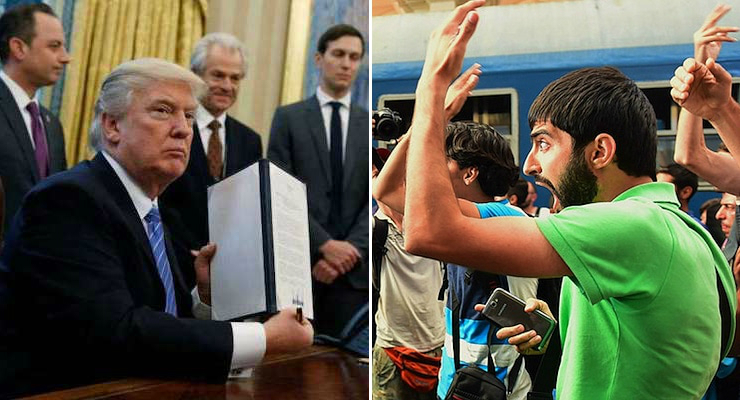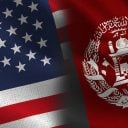

President Donald J. Trump, left, shows his signature on an executive order in the Oval Office in Washington, and, a Syrian refugee, right, yells at a Hungarian border guard.
The State of Hawaii on Wednesday filed a lawsuit to block President Donald J. Trump’s revised executive order travel ban before it even goes into effect. Democrat Attorney General Doug Chin argued the “the new executive order is resulting in the establishment of religion in the State of Hawaii contrary to its state Constitution.”
The filing also argues the revised ban will damage Hawaii’s “economy, educational institutions, and tourism industry; and it is subjecting a portion of the state’s citizens to second-class treatment and discrimination, while denying all Hawaii residents the benefits of an inclusive and pluralistic society.”
Despite the claim, the order itself makes no mention of religion and no longer gives preference to Christian refugees persecuted in the six Muslim-majority nations identified as hotbeds of Islamic terrorism. Further, roughly 90% of the world’s Muslim population is not impacted by the rewritten order.
Anticipating a wave of lawsuits expected to follow over the constitutionality of the proposal, the Trump Administration and White House counsel addressed all the concerns of the liberal activist courts that previously granted opposition a temporary stay on the initial order signed by President Trump, which was rescinded.
The “Executive Order Protecting The Nation From Foreign Terrorist Entry Into The United States” specifically cites the president’s authority granted by the U.S. Constitution and the U.S. Congress, specifically the Immigration and Nationality Act (INA), to suspend refugee entries for 120 days.
Whenever the President finds that the entry of any aliens or of any class of aliens into the United States would be detrimental to the interests of the United States, he may by proclamation, and for such period as he shall deem necessary, suspend the entry of all aliens or any class of aliens as immigrants or nonimmigrants, or impose on the entry of aliens any restrictions he may deem to be appropriate.
However, unlike the first order, it also details categories of people eligible to enter the United States for business or medical travel purposes. no longer will suspend Syrian refugee admissions indefinitely and excludes Iraq. Still, lawyers for the state of Hawaii, the most liberal state in the country, said they will move for a temporary restraining order on March 15, a day before the new executive order is supposed to take effect.
“This new executive order is nothing more than Muslim Ban 2.0,” Mr. Chin said in a statement Monday. “Under the pretense of national security, it still targets immigrants and refugees. It leaves the door open for even further restrictions.”
The new order also excludes green card holders, but still applies to travelers from Iran, Libya, Somalia, Sudan, Syria and Yemen who did not obtain a visa before Jan. 27 from entering the United States for 90 days. For countries impacted by the order, there is a 50-day window to comply with requests to improve the “quality” of the information provided to U.S. officials for the purpose of vetting.
Meanwhile, President Trump’s executive action comes on the heels of the Department of Homeland Security revealing nearly a third of the 1,000 domestic terrorism cases currently being investigated by the Federal Bureau of Investigation (FBI) involve those admitted to the U.S. as refugees.
Officials said some of those 300 came to “infiltrate” the U.S., while others were radicalized once they were in the country.
In 2015, FBI Director James Comey said the Bureau was investigating roughly 900 terror probes including every U.S. state. But Monday’s leaked report represents the first official solid tie between the refugee resettlement program and an increase in terrorism.
“If that becomes the new normal, that would be hard to keep up,” ” Director Comey said.
[social-media-buttons]






